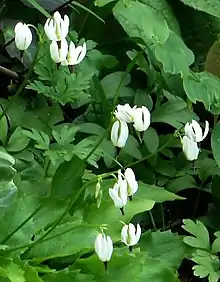Primula latiloba
Primula latiloba, synonyms Dodecatheon dentatum and Dodecatheon latilobum,[2] is a species of flowering plant in the family Primulaceae, known by the common names white shooting star and toothed American cowslip.
| Primula latiloba | |
|---|---|
 | |
| Scientific classification | |
| Kingdom: | Plantae |
| Clade: | Tracheophytes |
| Clade: | Angiosperms |
| Clade: | Eudicots |
| Clade: | Asterids |
| Order: | Ericales |
| Family: | Primulaceae |
| Genus: | Primula |
| Section: | Primula sect. Dodecatheon |
| Species: | P. latiloba |
| Binomial name | |
| Primula latiloba (A.Gray) A.R.Mast & Reveal | |
| Synonyms[2] | |
| |
It is native to areas of western North America, British Columbia, Idaho, Oregon and Washington.[2]
Description
Primula latiloba is an herbaceous perennial growing to 40–50 cm (16–20 in) in height.
This species has toothed (dentate) leaves, hence one of its common names.[3] The leaves have pointed oval blades up to 10 cm long by 6 cm wide with wavy or toothed edges. Each is borne on a long, winged petiole.
The inflorescence contains 1 to 12 flowers. It arises on a tall, erect flowering stalk. The flower corolla has five white lobes each 1 or 2 centimeters long. They are reflexed away from the flower's center, which contains one style surrounded by large reddish, purplish or black anthers containing pollen.[4][5] Its bloom period is May to July.
The petals are white or cream. It is the only shooting star to have populations with consistently white flowers.[3]
Taxonomy
The species was first described as Dodecatheon dentatum by William Jackson Hooker in 1838.[6] In 1876, Asa Gray described Dodecatheon meadia var. latilobum. In 1905, this taxon was raised to a full species, Dodecatheon latilobum.[7] Dodecatheon latilobum is now regarded as a synonym of Dodecatheon dentatum. In 2007, when the genus Dodecatheon was reduced to a section of Primula, it was necessary to transfer the species to Primula. However, the name Primula dentata had already been published (in 1819) for a different species, so the next oldest epithet was used and Dodecatheon dentatum became Primula latiloba.[8]
Subspecies
Some subspecies were defined within Dodecatheon dentatum, but are now regarded as separate species.
- Dodecatheon dentatum subsp. ellisiae is a synonym of Primula standleyana.[9]
- Dodecatheon dentatum subsp. utahense is a synonym of Primula utahensis.[10]
No subspecies remain in Primula latiloba.[2]
Cultivation
Primula latiloba is cultivated as a perennial ornamental plant, used in traditional and native plant shade gardens.[3] It is of special value to native bumble bees.[3] The plants usually go dormant almost immediately after flowering.[3]
References
- NatureServe (5 May 2023). "Dodecatheon dentatum". NatureServe Network Biodiversity Location Data accessed through NatureServe Explorer. Arlington, Virginia: NatureServe. Retrieved 14 May 2023.
- "Primula latiloba (A.Gray) A.R.Mast & Reveal". Plants of the World Online. Royal Botanic Gardens, Kew. Retrieved 2022-04-14.
- NPIN: Dodecatheon dentatum
- Dodecatheon dentatum. Washington Burke Museum.
- Dodecatheon dentatum. Flora of North America.
- "Dodecatheon dentatum Hook." The International Plant Names Index. Retrieved 2022-04-14.
- "Dodecatheon latilobum (A.Gray) Elmer ex R.Knuth". The International Plant Names Index. Retrieved 2022-04-14.
- Mast, Austin R. & Reveal, James L. (2007), "Transfer of Dodecatheon to Primula (Primulaceae)", Brittonia, 59: 79–82, doi:10.1663/0007-196X(2007)59[79:TODTPP]2.0.CO;2, S2CID 36908769, retrieved 2022-04-14
- "Dodecatheon dentatum subsp. ellisiae (Standl.) H.J.Thomps." Plants of the World Online. Royal Botanic Gardens, Kew. Retrieved 2022-04-14.
- "Dodecatheon dentatum subsp. utahense (N.H.Holmgren) Kartesz". Plants of the World Online. Royal Botanic Gardens, Kew. Retrieved 2022-04-14.
